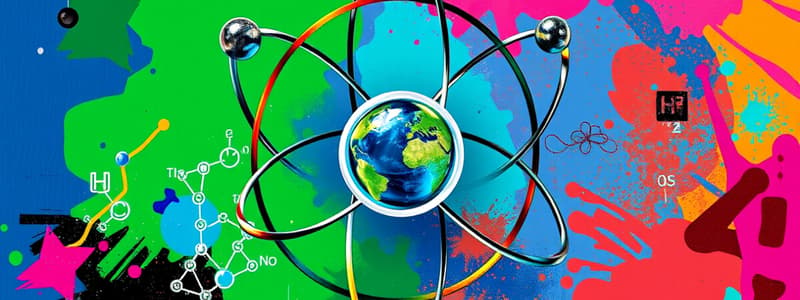Podcast
Questions and Answers
How many protons are there?
How many protons are there?
Number of protons varies by element.
How many electrons are there?
How many electrons are there?
Same as the number of protons in a neutral atom.
A neutral atom has an equal number of protons and electrons.
A neutral atom has an equal number of protons and electrons.
True (A)
What is ionization?
What is ionization?
Which of the following particles are found in an atom?
Which of the following particles are found in an atom?
What does the atomic number represent?
What does the atomic number represent?
What is an isotope?
What is an isotope?
Flashcards are hidden until you start studying
Study Notes
Atomic Structure
- Atoms are the basic building blocks of elements, composed of protons, neutrons, and electrons.
- An element contains only one type of atom, e.g., Hydrogen.
- Molecules form when two or more atoms combine, such as H2O (water) being made of hydrogen and oxygen.
- Chemical compounds consist of one type of molecule.
Atom Composition
- Protons have a positive charge; neutrons are neutral; electrons have a negative charge.
- The atomic number represents the number of protons in an atom.
- Atomic mass is calculated by summing protons and neutrons.
Organization of Elements
- Elements are organized in the periodic table according to their atomic number.
- Isotopes: same atomic number but different atomic mass due to varying neutrons.
- Isobars: different atomic numbers but same atomic mass.
- Isotones: different atomic numbers and atomic masses but the same number of neutrons.
- Isomers: same atomic number and atomic mass with different energy states.
Neutral Atoms and Ionization
- In a neutral atom, the number of electrons equals the number of protons.
- If an atom gains or loses electrons, it becomes ionized.
- Ionization involves the addition or removal of orbital electrons.
Key Properties of Isotopes, Isobars, Isotones, and Isomers
- Isotopes have the same atomic number but different neutron counts.
- Isobars have different atomic numbers but identical atomic masses.
- Isotones share the same number of neutrons but have different atomic masses.
- Isomers have the same atomic structure but differ in energy states.
Studying That Suits You
Use AI to generate personalized quizzes and flashcards to suit your learning preferences.




